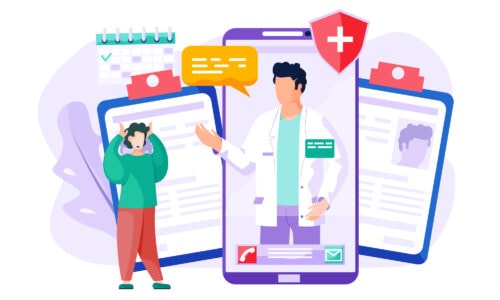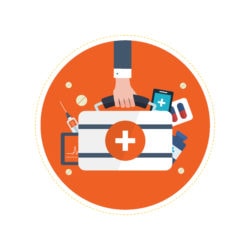Hospital systems across the country are introducing fees for certain email messages sent to physicians. With the growing popularity of telehealth, doctors are increasingly communicating with patients through online portals, resulting in a notable time investment. However, patient advocates are concerned that these fees might discourage people from contacting their doctors and place an additional burden on patients. Opponents argue that such fees may have negative impacts on patient care and result in poorer outcomes as well as higher costs.
When Did Doctors Start Charging Patients for Email Responses?
These fees emerged due to increased telehealth usage due to the COVID-19 pandemic and the rise of online patient portals. These platforms allowed patients to message their doctors easily, but physicians quickly found themselves overwhelmed by the volume of correspondence.
Numerous hospitals across the nation have started to implement fees for certain messages that patients send to doctors. This is meant to offset healthcare professionals’ time and effort to review complex email inquiries that necessitate specialized medical knowledge typically provided during in-person visits.
How Much do Doctors Charge for Email Communications?
As they adopt these new policies, health systems must inform patients that charges may apply when they communicate with their physician via online portals like MyChart, supported by EMR company Epic, which is used by multiple organizations to manage appointments and share test results. Patients can expect to receive a bill for messages that include sharing images of a new skin rash, requesting a form to be completed, or asking for a change in medication.
The fees for messages vary; they currently range from $3 for Medicare patients to $160 for patients without insurance and are often tied to the amount of time the doctor spends responding.
Despite the convenience and potential saving benefits associated with online advice, critics argue that charging patients for messages may have unintended consequences as people could end up seeking unreliable or free advice online instead of contacting their healthcare provider.
What Types of Emails Can Doctors Charge to Patients?
Due to the added workload that comes with online correspondence, new billing rules allow doctors to bill Medicare for as little as 5 minutes spent on an online message within a seven-day period. Certain messages, such as prescription refills, appointment scheduling, and follow-up questions from a recent visit, will not result in charges. However, messages involving more complex concerns, like seeking advice on a new rash, requesting a form to be filled out, or asking for a change in medication, can lead to additional fees.
Why do Some Patients Prefer to Email their Health Providers?
Email offers a convenient way to connect with your doctor, allowing you to quickly ask questions or set up appointments without making phone calls. Doctors can share helpful articles, resources, or tips to keep you healthy through email. They can also use email to remind you about upcoming appointments or essential health screenings. Additionally, emailing your doctor is covered by HIPAA, which ensures the protection and confidentiality of your health information.
Should I Encourage My Patients to Send Emails?
The advantages of doctors using email to communicate with patients include ease of interaction, avoiding phone tag, timely provision of accurate medical information, and fostering goodwill and positive ratings. Email communication allows physicians to efficiently handle departmental business and consult with colleagues, making it a powerful tool in medicine.
However, adopting email communication in healthcare also requires establishing professional guidelines, ensuring patient privacy through encryption, and developing methods for compensating physicians for time spent in electronic communication. Incorporating email and text messages into electronic medical records is necessary for medical-legal reasons, ensuring that all doctor-patient interactions are documented.
Despite the importance of face-to-face office visits, the digital revolution is changing healthcare. To effectively integrate technology into healthcare delivery, it is essential to strike a balance between personal interactions and the convenience of digital communications. This will ensure improved patient outcomes and higher quality of care.
Finding a Balance with Doctor-Patient Communications
More and more doctors are adopting the use of email in healthcare. It is increasingly important in patient-centered care and accessibility by allowing faster and flexible communication with practitioners. Anecdotal evidence suggests many clinicians use email without guidelines, potentially impacting patient safety and medicolegal situations. Emails can be used to ask about management and medication, request results and reviews, or send messages of gratitude.
Clinicians often express concerns about the time required for email correspondence, but studies indicate the daily time spent is minimal. Email can save time and resources by removing the need for scheduling phone calls or appointments. However, proper administrative procedures, such as email organization, must be in place. Additionally, concerns surrounding patient confidentiality can be addressed by obtaining consent for email communication and offering options for encryption. To prevent over-reliance on emails, it is advisable to establish expectations for response timing and frequency, with email services revoked in the case of abuse.
Email should be viewed as a complementary form of communication rather than a complete replacement of other methods. The use of email can be specifically beneficial for certain situations and preferences, but clinicians should ensure they don’t overlook patients without email access. Developing and disseminating local guidelines for email communication in healthcare can help manage the issues discussed and effectively integrate email into patient care.
Related article: Should Healthcare Providers Bill for Patient Phone Calls?
How PatientCalls Makes Answering Emails Easier
As a medical answering service provider, PatientCalls specializes in providing comprehensive solutions to assist healthcare providers who accept emails from patients. Our services are designed to streamline patient-provider communication, ensuring a smooth and efficient experience for both parties.
Our professionally trained agents are equipped to review, categorize, and prioritize incoming emails from patients to ensure that urgent matters are given immediate attention. In addition to working as a doctors answering service, our team can provide email support by sending reminders and notifications to patients, such as appointment confirmations, preventive care reminders, or important health updates, keeping them engaged and well-informed throughout their healthcare journey.
Plus, our call center handles appointment scheduling, prescription refill requests, and general inquiries, thereby reducing the administrative workload for healthcare providers. This also helps decrease patient response times and ensures their concerns are addressed efficiently.
References
- Associated Press; Amanda Seitz, “Want to Email Your Doctor? You May be Charged for That,” December 2022.
- The British Medical Journal; Helen Sowerbutts, “How best to use email with patients,” January 2016.
- Zoc Doc; Dr. Kevin Campbell, “Is it Okay for Doctors to Email and Text Patients?”







